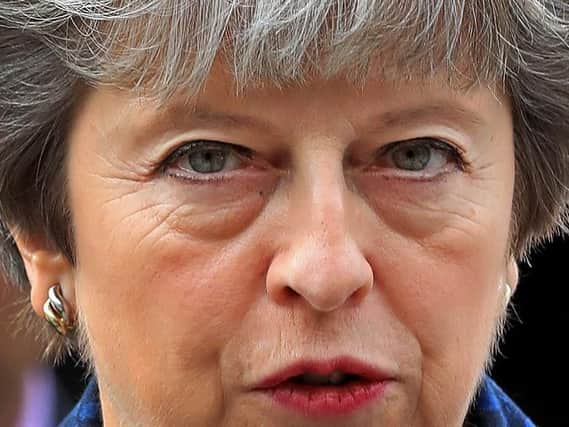'Stuck in the middle with you... and no one to vote for'


The Yorkshire Post says: It's time for unity over Brexit - for the sake of British businessesLike an underwhelmed audience trooping out of a theatre after sitting through a creaky, clichéd melodrama performed by hams, the electorate can feel with every justification that the leading actors are not fit to take centre stage.
Across the spectrum, from left to right, there is barely a glimmer of genuine credibility to be seen. There is posturing in spades, but little of substance.
Advertisement
Hide AdAdvertisement
Hide AdAnybody hoping that the Prime Minister’s closing speech to the Conservatives tomorrow will end the conference season on a high note is likely to be disappointed.
Harried by plotters in her own party, and beset by the consequences of her disastrous election gamble, Theresa May will struggle to throw off the air of doom that characterised her appearance on Andrew Marr’s programme on Sunday.
The conferences have offered few answers to the problems facing Britain, but they have raised a single, pressing question.
What has happened to the centre ground in British politics? Elections over the past 25 years have told us conclusively that this is where the great silent majority of the electorate want politics to be, whether voting for the centre-right administrations of John Major or David Cameron, or the centre-left of Tony Blair.
Advertisement
Hide AdAdvertisement
Hide AdDepending on the policies and personalities on offer, voters have stepped to either side of the line dividing left and right, though never too far. Just as footballers stick to the centre circle for kick-off, they have been inclined to remain in the middle of the pitch rather than charging to the left or right wings.
But to whom do these voters look whenever the next election comes, after the main parties have demonstrated that they are running at full tilt – or being dragged – away from the centre?
A collective madness over Brexit and the EU has gripped the Tories, sending them lurching to the right under pressure from unappealingly Machiavellian figures such as Boris Johnson and Jacob Rees-Mogg.
It is a measure of how out-of-touch with ordinary voters’ hearts and minds the party has become that it not only tolerates Johnson’s endless undermining of the government he supposedly serves in pursuit of his own vaunting ambition, but seriously considers him a leader in waiting who could win an election.
Advertisement
Hide AdAdvertisement
Hide AdAll the while, the Conservatives haemorrhage support, sinking in the opinion polls, becoming increasingly toxic to the young and drifting away from the centre ground where elections are won.
Then there is Labour, gripped by a different form of madness, a messiah complex about Jeremy Corbyn, cast by his adoring supporters at last week’s conference as a prophet come to lead the country into a socialist paradise.
To paraphrase the best-known line from Monty Python’s Life of Brian: “He’s not the messiah, he’s a very naughty old Trot.”
Amid the fervour of his supporters, it almost seemed to be overlooked that Labour lost the last election. Yes, it did much better than expected, but still came nowhere near winning, even against a woefully-led and divided Conservative Party which ran the most inept campaign in living memory.
Advertisement
Hide AdAdvertisement
Hide AdNevertheless, the result has inspired Labour’s leadership to move yet further from the centre ground with a raft of hard-left policies that are the despair of its moderate MPs, who know their constituents are not clamouring for Britain to return to the strife-torn 1970s.
There was a time when the Liberal Democrats might have benefited from the policy mistakes of the two biggest parties, but there is little sign of them doing so, not least because their leader is the epitome of shifty political expediency.
Sir Vince Cable is not a figure to inspire mass support or trust, or to claim the centre ground for his party.
There are points of comparison with Boris Johnson, as both have spent time in government pursuing their own agendas rather than devoting themselves to the greater good.
Advertisement
Hide AdAdvertisement
Hide AdOver all three parties looms the giant shadow of Brexit, yet none advance convincing, let alone coherent, policies on Britain’s future outside the EU. Labour pulled off the astonishing sleight-of-hand of avoiding the subject altogether, whilst Tory knuckles are skinned raw from punch-ups over the issue.
In the middle of it all is the abandoned centre ground, symbol of a divisive new political landscape, which is splitting Britain along generational lines.
The young look left in search of idealism. The older, fearing the consequences of a return to the past, look right, albeit reluctantly. This is not a formula for a happy country, and voters whose instincts favour sensible, mainstream, centrist politics can only despair.
Read Andrew Vine every Tuesday in The Yorkshire Post
Read more:
The Yorkshire Post says: It's time for unity over Brexit - for the sake of British businessesHammond rail pledge ‘needs to be followed by billions more’Analysis: Listening is fine, but May needs to offer direction tooAnalysis: Form an orderly queue under the magic money treeNobody is unsackable, says Hammond amid Johnson 'disloyalty' accusations'What Theresa May needs to do to turn around the Tories at the Conservative Party conference'